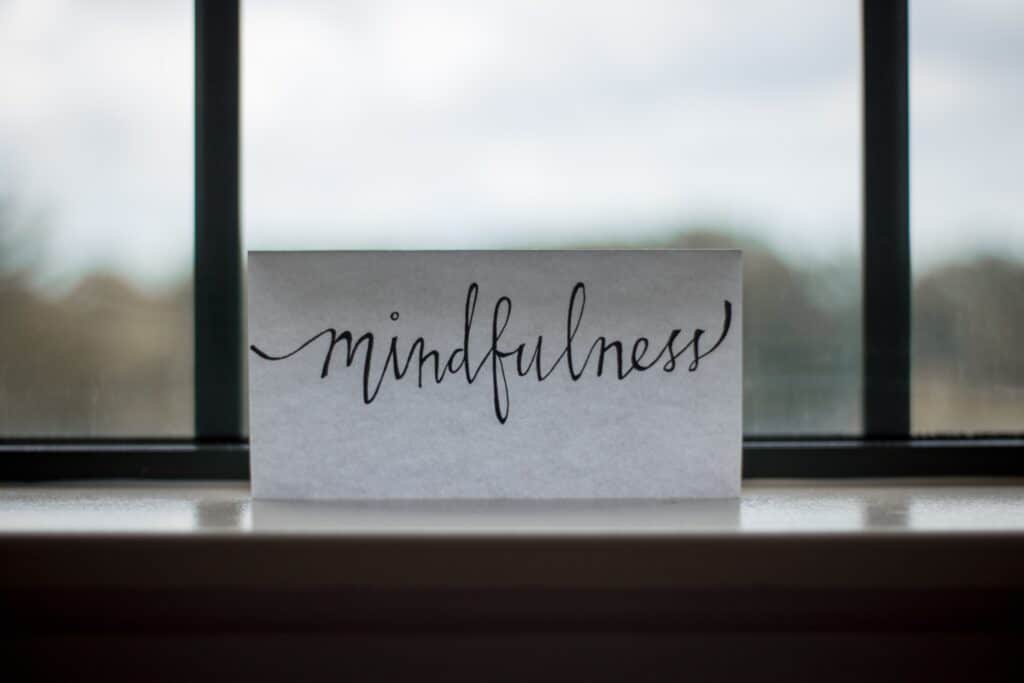What does it mean to be mindful and present?
A Simple Definition. Mindfulness means living in the present moment. Essentially, it means being (intentionally) more aware and awake to each moment and fully engaging in what is happening in one’s surroundings – with acceptance and without judgment.
In today’s fast-paced world, it can be easy to become overwhelmed with stress and anxiety. Mindfulness is a practice that can help us to live more in the present moment and let go of these negative feelings. When mindful, we pay attention to our thoughts and feelings without judgment. This allows us to become more aware of what is happening in the present moment and less caught up in worrying about the future or dwelling on the past.
There are many ways to incorporate mindfulness into your life. You can meditate, practice yoga or tai chi, or take a few moments each day to focus on your breath and be present in the moment.
The Basics of Mindfulness
Mindfulness is the practice of living in the present moment. It involves paying attention to your thoughts, emotions, and sensations without judgment. Mindfulness can help you to become more aware of your surroundings and to understand your thoughts and feelings better. It can also help you to manage stress and to improve your focus and concentration.
The benefits of mindfulness
Living in the present moment can be a challenge. Our minds constantly race, thinking about the past or worrying about the future. This can make it difficult to focus on the task at hand or enjoy the moment we’re in. Mindfulness is a practice that can help us to be more present and aware of our thoughts and surroundings.
There are many benefits of mindfulness, especially when it comes to learning. When we’re mindful, we’re better able to focus and pay attention. We’re also less likely to be distracted by our thoughts or emotions. This can help us to retain information and improve our concentration. Additionally, mindfulness can help us to be more patient and less reactive.
How to practice mindfulness
Learning to be mindful is training your mind to focus on the present moment. This can be done through various practices, such as meditation, yoga, and breathing exercises. The key is to find a practice that works for you and stick with it.
When you first start practising mindfulness, it may be difficult to focus on the present moment. However, with time and practice, it will become easier. The key is to be patient and to keep at it. Mindfulness is a journey, not a destination. So take your time and enjoy the ride.
Mindfulness in Everyday Life
Mindfulness is the practice of living in the present moment and being aware of your thoughts, feelings, and surroundings. It can help you to better understand yourself and the world around you. Learning to be mindful can benefit many areas of your life, including your academics.
Mindfulness can help you to focus on your studies and pay attention to the task at hand. It can also assist you in managing distractions and keeping your thoughts organised. When you can be present in the moment, you are more likely to retain information and perform better on exams.
In addition to improving your academic performance, mindfulness can help reduce stress and anxiety. It can promote better sleep and overall physical health.
Mindfulness at work
Mindfulness is the practice of living in the present moment. It is about being aware of your thoughts, feelings, and surroundings without judgment. When you are mindful, you can focus on your work and be more productive.
Learning to be mindful can be difficult, but it is worth it. Mindfulness has many benefits, including reducing stress, improving concentration, and increasing your overall well-being. If you are looking to improve your work life, learning to be mindful is a great place to start.
Mindfulness with family and friends
When we are with our family and friends, it is easy to get caught up in the past or worry about the future. However, if we learn to be mindful in the present moment, we can truly enjoy our time with loved ones.
One way to be more mindful with family and friends is to focus on the present conversation. Listen to what the other person is saying and try to understand their point of view. If our mind starts to wander, gently bring it back to the present moment.
Another way to be more mindful is to be aware of our body language and nonverbal cues. Are we making eye contact and smiling? Or are we crossing our arms and looking away?
Mindfulness when you’re feeling stressed
Mindfulness is the practice of living in the present moment. When you’re feeling stressed, it can be difficult to be mindful. However, mindfulness can help you to cope with stress and to find calm amid chaos. Learning to be mindful takes practice, but it is well worth the effort. Here are some tips for practising mindfulness when you’re feeling stressed:
1. Pay attention to your breath. Taking slow, deep breaths can help you relax and focus on the present moment.
2. Observe your thoughts and emotions. Don’t judge them; observe them. See if you can let them go and return your focus to your breath.
3. Focus on your senses. What do you smell, see, taste and feel at this moment? Take time to explore each sense and enjoy the present experience.
Notice Your Surroundings
One of the biggest benefits of mindfulness is that it can help you to manage stress. Stress can feel overwhelming, but it doesn’t have to be. With mindfulness training, you can better handle stressful situations and feelings of frustration and despair. You may also find fewer negative feelings like anger, resentment and jealousy.



